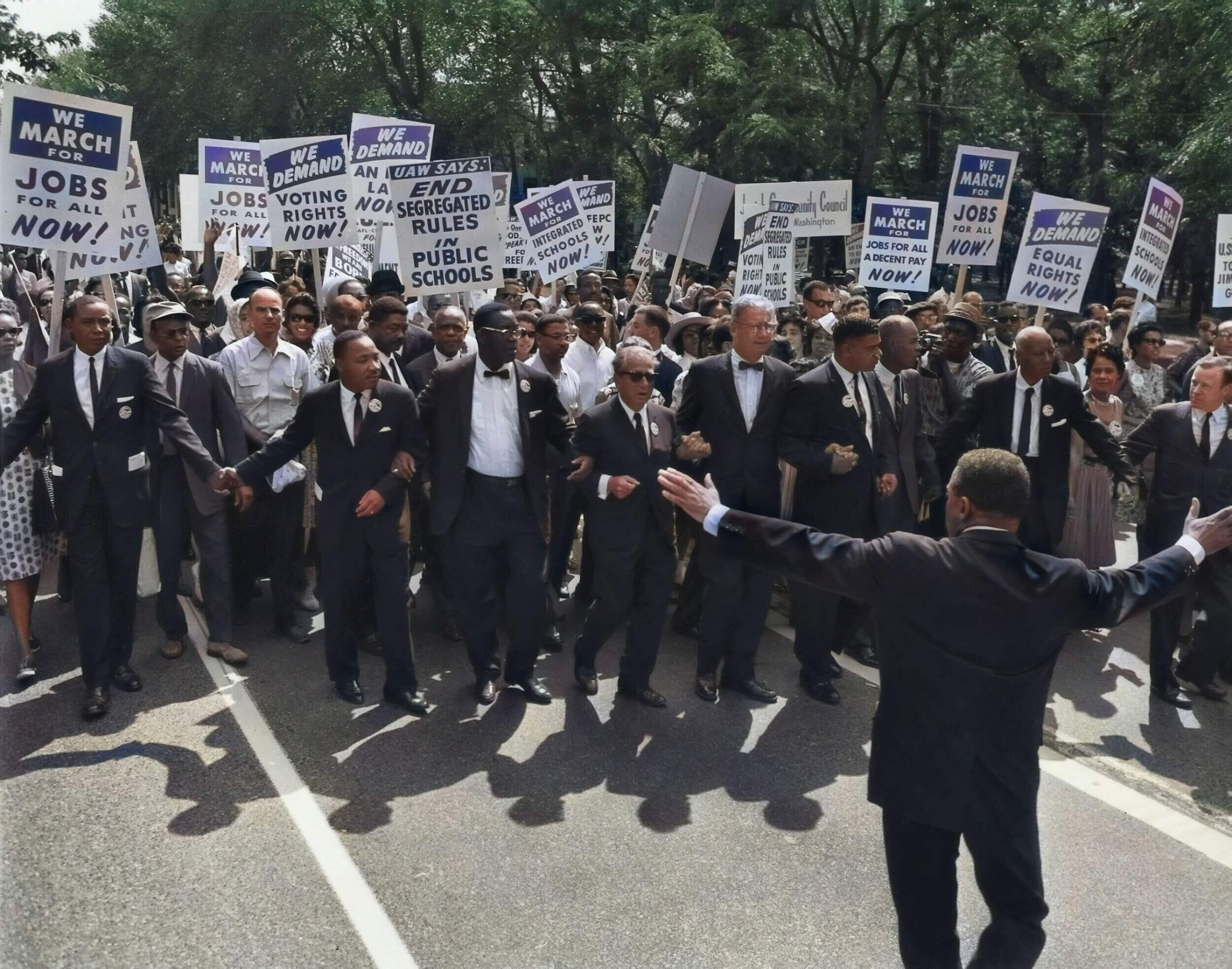Theologian's Almanac for Week of August 28, 2022
Welcome to SALT’s “Theologian’s Almanac,” a weekly selection of important birthdays, holidays, and other upcoming milestones worth marking — specially created for a) writing sermons and prayers, b) creating content for social media channels, and c) enriching your devotional life.
For the week of Sunday, August 28:
August 28 is the anniversary of the 1963 March on Washington for Jobs and Freedom (next year is the 60th anniversary!). Organizers A. Philip Randolph and Bayard Rustin worked tirelessly for nearly two years, eventually convincing the National Association for the Advancement of Colored People and the Southern Christian Leadership Conference to set aside their differences and join the effort.
When the day came, thousands poured into the city from all over the country, coming in by bus, train, car, and plane. Chicago and New York officially declared August 28 “Freedom Day,” and gave workers the day off. On the other hand, many feared the march would become violent; the Pentagon put 19,000 troops in the suburbs, just in case.
But in the end there was no violence (there wasn’t a single arrest!). The marchers peacefully sang and chanted all the way to the Lincoln Memorial, where the 16th speaker that day, the Rev. Dr. Martin Luther King Jr., delivered what would become one of the most celebrated pieces of oratory in American history, part sermon, part rallying cry. Most of the speech revolved around the idea that America has not yet made good on the many promises it has given African Americans; the country has thus far defaulted, King declared, on that “promissory note.”
The renowned gospel singer Mahalia Jackson had sung “How I Got Over” just before King spoke, and earlier that summer, she had heard him deliver a speech in Detroit that featured the stirring “I have a dream!” refrain. And so that day in August on the steps of the Lincoln Memorial, as the young preacher neared the end of his remarks, Jackson called out to him, “Tell them about the dream, Martin!” — and King responded, extemporaneously delivering the words many Americans now know by heart, ending with these:
“When we allow freedom ring, when we let it ring from every village and every hamlet, from every state and every city, we will be able to speed up that day when all of God’s children, black men and white men, Jews and Gentiles, Protestants and Catholics, will be able to join hands and sing in the words of the old Negro spiritual: Free at last! Free at last! Thank God Almighty, we are free at last!”
Here’s SALT’s short film in tribute to that powerful day in American history.
September 1 is the day in 1773 that 20-year-old Phillis Wheatley published Poems on Various Subjects, Religious and Moral, the first book of poetry published by an African-American. Kidnapped in West Africa at the age of eight and put on the Phillis, a slave ship, she was sold to a prominent tailor in Boston, John Wheatley, and was manumitted in 1778 — two years after George Washington invited her to his headquarters to meet her, so impressed was he with her poetry. She rarely wrote about herself or her life as an enslaved person, with the notable exception of “On Being Brought from Africa to America,” a poem in which Wheatley pointedly admonishes “Christians” that “Negroes,” too, may “join th’ angelic train.”
September 2 is the birthday of the Austrian writer Joseph Roth, born in 1894, who wrote The Wandering Jews, a book of essays about the plight of European Jews struggling to survive. Of the shtetl, the small Jewish towns of Eastern Europe, Roth wrote: “The shtetl Jews are not rare visitors of God, they live with him. In their prayers they inveigh against him, they complain at his severity, they go to God to accuse God. There is no other people that lives on such a footing with their god. They are an old people and they have known him a long time!”
September 3 is the date in 1838 that Frederick Douglass, disguised as a sailor, boarded a train to escape from enslavement. He went on to become a tireless advocate for abolition, as well as for women’s suffrage; in 1848, Douglass was one of the original signatories of Elizabeth Cady Stanton’s “Declaration of Rights and Sentiments.” “I love that religion,” he wrote, “which sends its votaries to bind up the wounds of those who have fallen among thieves.” And again: “No man can put a chain about the ankle of his fellow man without at last finding the other end fastened around his own neck.”
September 3 is also the birthday of anthropologist, naturalist, and author Loren Eiseley, born in Lincoln, Nebraska, in 1907. In poetic, evocative prose, he wrote a series of books that inspired a generation of nature writers, including The Immense Journey (1957), The Unexpected Universe (1969), The Night Country (1971), and The Star Thrower (1979). His essay, “How Flowers Changed the World,” is a little masterpiece, and a classic example of Eiseley’s knack for evoking creation’s wonder: “The fantastic seeds skipping and hopping and flying about the woods and valleys brought with them an amazing adaptability. If our whole lives had not been spent in the midst of it, it would astound us. The old, stiff, sky-reaching wooden world changed into something that glowed here and there with strange colors, put out queer, unheard of fruits and little intricately carved seed cases, and, most important of all, produced concentrated foods in a way that the land had never seen before, or dreamed of back in the fish-eating, leaf-crunching days of the dinosaurs…”

